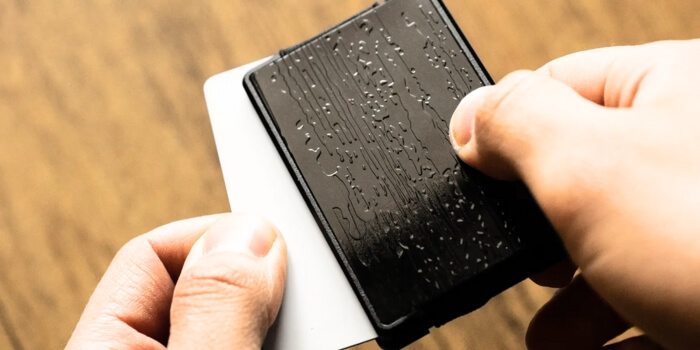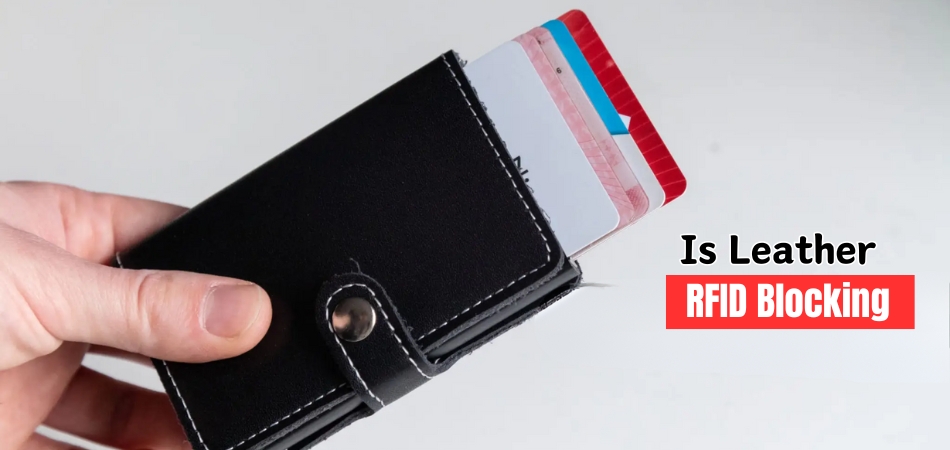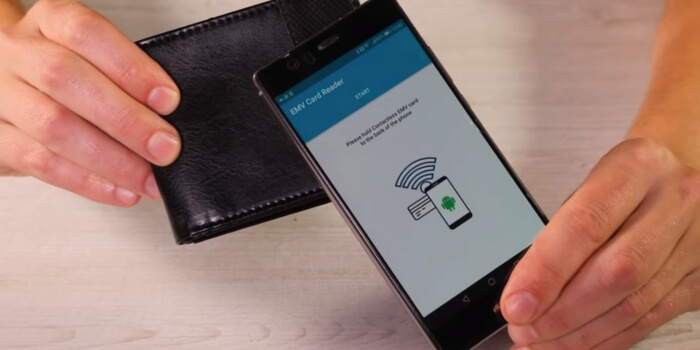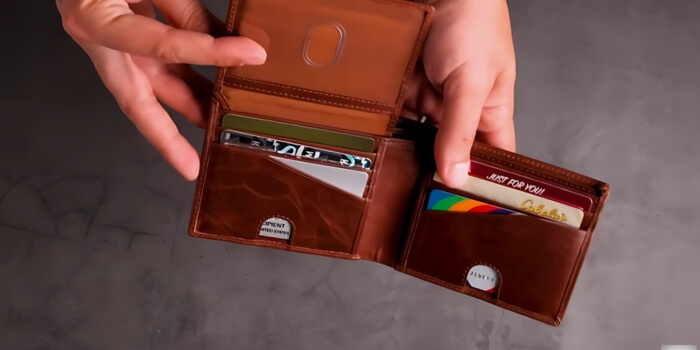It’s the Wallet Defender: your trusty sidekick against digital pickpocketing. The Wallet Defender promises both fashion and function with its premium leather and sleek designs. Here’s the burning question: Is leather RFID Blocking?
Yes, leather can be RFID blocking if it’s treated with special materials or layers designed to block radio frequency signals. Some leather products aren’t RFID-protected, so be sure to check for specific RFID-blocking features when buying leather items.
We will explore the world of RFID-blocking technology and leather craftsmanship together to gain a deeper insight into it. Let’s find out what lies behind this buzzword and find out what the real truth is behind it.
RFID Technology Overview
RFID uses electromagnetic fields to identify and track tags attached to objects automatically. Tags store electronic information that can be retrieved remotely with RFID readers. Various industries use RFID technology for inventory management, access control, and asset tracking.

This technology is used by products, like Wallet Defender, and is designed to safeguard your personal information from electronic theft. It creates a protective shield that blocks the radio frequency signals emitted by RFID chips, commonly found in cards and passports.
Credit card numbers and passport information can’t be accessed by scanners or skimmers. The Wallet Defender uses advanced RFID blocking, which forms a barrier around RFID chips, making sure they can’t transmit data to unauthorized devices.
Although this technology effectively protects against electronic theft, it’s important to stay vigilant against other forms of fraud and identity theft.
Is Leather RFID Blocking?
Yes, Leather can potentially block RFID signals, but it depends on various factors. Firstly, We need to know about RFID blocking wallets. Let’s dive into what influences Leather’s RFID blocking capabilities. Arrangement of these factors will help you assess if a product like Wallet Defender meets your security needs.

Material Thickness
Thicker leather tends to provide better RFID blocking as it offers more barriers for electromagnetic signals to penetrate. When choosing a leather product like Wallet Defender, consider the thickness of the leather used in its construction.
Quality of Leather
The quality of leather can vary greatly, affecting its RFID blocking properties. Higher-quality leather, like full-grain or top-grain, tends to be denser and more effective at blocking RFID signals compared to lower-quality leather.
Tanning Process
The tanning process can influence how effectively leather blocks RFID signals. Some tanning methods incorporate materials that enhance RFID blocking capabilities, making the leather more effective at protecting your sensitive information.
Construction Design
The design of the product, such as how seams are stitched and if additional RFID blocking materials are integrated, can impact its overall RFID blocking effectiveness. Wallet Defender may include specific design features aimed at enhancing its RFID blocking capabilities.
How Does RFID Blocking Work?
RFID blocking is a technique used to protect sensitive information stored on RFID cards from unauthorized scanning. Here’s how it works:

Potential Security Risks
While convenient, RFID technology can pose security risks. Unauthorized individuals equipped with RFID scanners can intercept and read the information stored on RFID tags.
Blocking Signals
RFID blocking works by using materials that interfere with radio waves. These materials, typically composed of metal or conductive carbon, create a barrier that prevents RFID signals from penetrating.
Faraday Cages
One common method of RFID blocking is the use of Faraday cages. These cages are made of conductive material that blocks electromagnetic fields, effectively shielding the RFID card from external scanning.
Shielded Wallets and Sleeves
Another popular approach is the use of shielded wallets or sleeves. These products contain layers of RFID-blocking material, encasing the cards and preventing unauthorized access.
How to Choose the Right Leather RFID Blocking Product?
Choosing the right RFID blocking product like the Wallet Defender is crucial for protecting your sensitive information. By considering factors like material quality, RFID protection, design, size, and price, you can make an informed decision tailored to your needs and preferences.
Consider Material Quality
Opt for genuine leather over synthetic materials for durability and style. Ensure the leather is thick and sturdy, providing effective RFID protection. Look for reputable brands known for high-quality craftsmanship and reliable RFID-blocking technology.
Evaluate RFID Protection
Check if the product offers RFID protection for all your cards and IDs. Look for specifications stating the frequency range it blocks. Testimonials and reviews can also give insights into the product’s effectiveness in blocking RFID signals.
Assess Design and Functionality
Choose a design that suits your lifestyle and preferences. Consider factors like the number of card slots, compartments, and additional features such as coin pockets or ID windows. Ensure it’s practical and convenient for your everyday use.
Examine Size and Capacity
Find the right balance between compactness and storage capacity. Avoid overly bulky designs that are cumbersome to carry. Ensure it can accommodate all your essential cards and cash without being too bulky or uncomfortable in your pocket or bag.
Compare Prices and Warranty
Compare prices across different brands to ensure you’re getting value for money. Look for products that offer a warranty against defects or malfunctions. Consider the long-term investment and opt for quality over cheap alternatives.
How to Care for RFID-Protected Leather Wallets?
RFID-protected leather wallets, like the Wallet Defender, require specific care to maintain their quality and functionality. Proper maintenance ensures the longevity of both the leather and the RFID-blocking technology, safeguarding your cards from unauthorized scanning.

Regular Cleaning
Wipe the wallet gently with a soft, damp cloth to remove dust and dirt. Avoid using harsh chemicals or cleaners as they can damage the leather and compromise the RFID protection.
Conditioning the Leather
Apply a small amount of leather conditioner to a soft cloth and gently rub it onto the wallet’s surface. This helps keep the leather supple and prevents it from drying out or cracking over time.
Avoid Exposure to Extreme Conditions
Keep the wallet away from direct sunlight, heat sources, and excessive moisture. Exposure to these elements can cause the leather to fade, warp, or deteriorate, affecting its appearance and RFID-blocking capabilities.
Store Properly When Not in Use
When not using the wallet, store it in a cool, dry place away from direct sunlight. Consider using a dust bag or wrapping it in a soft cloth to protect it from dust and scratches.
Test RFID Protection Periodically
To ensure the RFID-blocking technology is working effectively, periodically test it by placing a contactless card inside the wallet and attempting to scan it with an RFID reader. If the card remains unreadable, the RFID protection is functioning correctly.
Handle with Care
Avoid placing sharp objects or heavy items inside the wallet, as they can cause scratches or deformations in the leather. Treat the wallet with care to maintain its appearance and functionality.
Seek Professional Cleaning if Needed
If the wallet becomes heavily soiled or stained, consider taking it to a professional leather cleaner. They have the expertise and specialized products to safely clean and restore the leather without compromising RFID protection.
FAQs For Is Leather RFID Blocking?
What’s the deal with leather RFID blocking? Here are some frequently asked questions about leather’s RFID-blocking capabilities:
Does All Leather Offer RFID Protection?
Not all leather products offer RFID protection. It depends on factors like material thickness, quality, tanning process, and construction design. Look for specific RFID-blocking features when purchasing leather items.
What Types of Leather Are Best for RFID Blocking?
Thicker and higher-quality leathers, such as full-grain or top-grain, tend to be more effective at blocking RFID signals due to their density and construction.
Can RFID-Blocking Leather Products Protect All Types of Cards and Ds?
Yes, RFID-blocking leather products like wallets can protect various cards and IDs containing RFID chips, including credit cards, passports, and access cards, from unauthorized scanning and digital theft.
How Can I Test if My Leather Product is Blocking RFID Signals?
You can test the RFID-blocking effectiveness of your leather product by placing a contactless card inside and attempting to scan it with an RFID reader. If the card remains unreadable, the RFID protection is functioning correctly.
How Do I Maintain the RFID-Blocking Properties of My Leather Item?
Regular cleaning, conditioning, proper storage away from extreme conditions, and handling with care are essential for maintaining the RFID-blocking capabilities of leather products.
Are There Any Additional Measures I Can Take to Enhance RFID Protection?
In addition to using RFID-blocking leather products, you can also consider using RFID sleeves or wallets with multiple layers of protection for added security against electronic theft.
Final Thought
As a result, making sure your RFID-blocking product is accurate is crucial. Consider factors like material quality, RFID protection, design, size, and price before you choose a leather RFID-blocking item, like the Wallet Defender.
Leather might block RFID signals, but it depends on things like thickness, quality, tanning process, and construction design. Both leather and RFID-blocking technology benefit from regular maintenance, including cleaning and conditioning. Make sure the RFID protection is working by testing it periodically.
Is Leather RFID Blocking? Yes, but choosing the right product and maintaining it properly is key to safeguarding your sensitive information.






